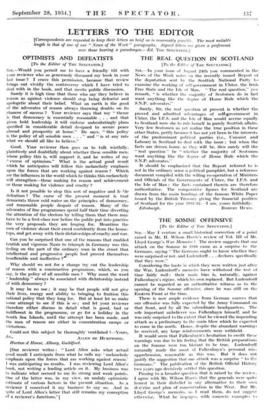LETTERS TO THE EDITOR
[Correspondents are requested to keep their letters as brief as is reasonably possible. The most suitable length is that of one of our " News of the Week" paragraphs. Signed letters are given a preference over those bearing a pseudonym.—Ed. THE SPECTATOR.]
OPTIMISTS AND DEFEATISTS
[To the Editor of THE SPECTATOR.] SIR, Would you permit me to have a friendly tilt with your reviewer who so generously discussed my book in your last issue ? I crave this permission, because that review brings out vividly the controversy which I have tried to deal with in the book, and that merits public discussion.
Surely it is -high time that those who say they believe in reason as against violence should stop being defeatist and apologetic about their belief. What on earth is the good of the advocates of reason always throwing doubts on its chances of success ? Your reviewer says that my " theme is that democracy is essentially reasonable . . . and that given bold leadership it will endorse unhesitatingly plans specified in considerable detail designed to secure peace abroad and prosperity at home." He says, " this policy is the policy of all sensible men . . . and " is at any rate what we should all like to believe."
Good. Your reviewer then goes on to talk wistfully, plaintively and doubtfully about whether these sensible men, whose policy this is, will support it, and he writes of my " excess of optimism." What is the actual good result which he anticipates will follow this melancholy emphasis upon the forces that are working against reason ? Which are the influences in the world which he thinks this melancholy will strengthen—those making for reason and achievement or those making for violence and cruelty ?
Is it not possible to stop this sort of negative and fc.-1)1e defeatism ? The. curse of the present moment is that democrats throw cold water on the principles of democracy, and reasonable people despair of reason. Many of the advocates of fine programmes spend half their time diverting the attention of the electors by telling them that there may have to be a first-class row before the public put into practice the very proposals they are longing for. Meantime the men of violence shout their creed confidently from the house- tops, and get away with their dictatorships of cruelty and war.
Can you be surprised that one of the reasons that enabled brutish and vigorous Nazis to triumph in Germany was this feeling on the part of the ordinary man in the street that intellectual and progressive people had proved themselves insufferable and ineffective Why should we not for a change try out the leadership of reason with a constructive programme, which, as you say, is the policy of all sensible men ? Why must the word leadership " always be associated with dictatorship instead of with democracy ?
It may be no use ; it may be that people will not give their lives, energy and ability to bringing to fruition this rational policy that they long for. But at least let us make some attempt to see if this is so ; and let your reviewer therefore either discuss in detail what is good, bad or indifferent in the programme, or go for a holiday in the South Sea Islands, until the attempt has been made, and the men of reason are either in concentration camps or victorious.
Could not this subject be thoroughly ventilated ?—Yours, Hurtwo;d House; Albury, Guildford.
{Our reviewer writes : " Lord Allen asks what actual good result I anticipate from what he calls my ' melancholy emphasis upon the forces that are working against reason.' I was anticipating no results. I was reviewing Lord Allen's book, not writing a leading article on it. My business was to indicate what seemed to me its strong and weak points. One of the latter was, in my view, an unduly optimistic estimate of various factors in the present, situation. As a reviewer I conceived it my business to say so: And in spite of Lord Allen's letter that still remains my conception of a reviewer's functions."]


















































 Previous page
Previous page